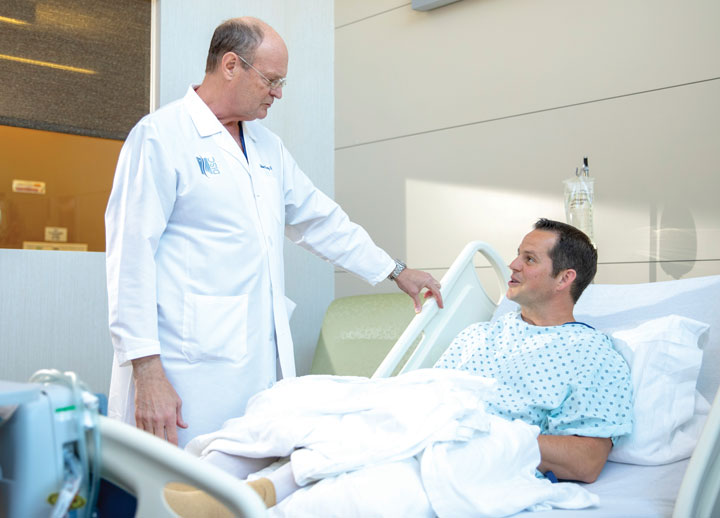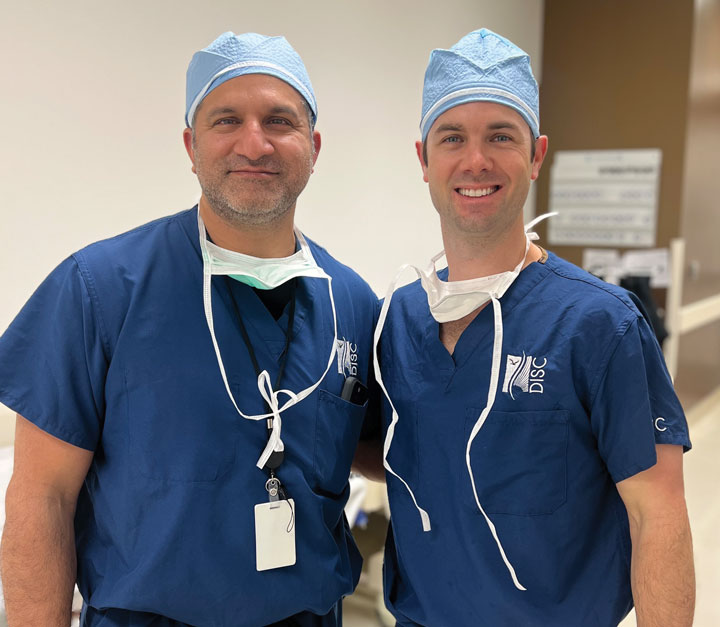- Home
- The Magazine
- Article
Unlocking the Potential of Outpatient Spine Surgery
By: Kendal Kloiber | Contributing Editor
Published: 5/2/2024
Advanced technologies and techniques are bringing more complex cases to the ASC setting.
In the realm of spine surgery, the traditional requirement of lengthy hospital stays after complex inpatient procedures is rapidly giving way to a new era of same-day spine procedures in outpatient settings. As technology evolves and surgical techniques advance, a growing number of patients can access more streamlined, efficient care — and a growing number of outpatient surgical facilities are there to provide it.
“In general, the advantage of outpatient surgery is just how patient-centered these facilities are,” says Ali H. Mesiwala, MD, FAANS, neurosurgeon at DISC Surgery Center in Newport Beach, Calif. “From a patient’s perspective, they’re going to a place that’s specialized for that specific type of surgery and is free from the chaos and complications that may exist in larger systems. For surgeons, you tend to have more input in the center, which can make cases more efficient.”
Spine is no exception, echoes Grant D. Shifflett, MD, orthopedic spine surgeon at DISC Surgery Center. He emphasizes the elevated level of care and personalized attention afforded to patients in outpatient settings. With a higher nurse-to-patient ratio and a singular focus on the procedure at hand, patients can navigate their surgical journey with confidence and ease.
“It’s a big quality-of-life boost for surgeons,” adds Dr. Shifflett. “Turnover times are quicker, and you are much closer to the patient and their recovery process. It leads to happier surgeons and happier patients — everyone wins.”
The expanding world of spine
A pivotal consideration in outpatient spine surgery revolves around patient selection. Dr. Shifflett carefully challenges the conservative traditional approach, operating on the premise that “every patient is a candidate until proven otherwise.” By shifting the focus from identifying ideal candidates to ensuring the safe management of all patients, he and Dr. Mesiwala believe surgeons can expand the scope of outpatient spine surgery. The proof is in the steady patient volume and safe, positive outcomes delivered every day at DISC facilities.
Advancements in technology and surgical techniques have been instrumental in driving the feasibility and success of outpatient spine procedures. In particular, Dr. Mesiwala notes the roles of imaging and minimally invasive approaches. With smaller incisions and innovative implants, DISC surgeons are achieving optimal outcomes while minimizing patient discomfort and reducing recovery times.
“It used to be that laminectomy, discectomy and pain procedures were the bread and butter of the outpatient spine world,” says Dr. Mesiwala. “But as time has passed, this has expanded to include anterior cervical single-level procedures, single-level lumbar fusions and anterior lumbar fusions as safe and reasonable procedures in an outpatient setting. Now we’re at a point where we’re able to do cases like multilevel fusions, posterior fusions, hybrid procedures and even spinal cord tumor resections at the surgery center.”
The implants used for spine procedures have become more efficient and effective. DISC recently participated in a study that examined the efficacy of two-level artificial disc replacement (see sidebar).
As a result, high-tech items like robotics and navigation aren’t necessary for the majority of spine surgeries, says Dr. Shifflett. “I think that the way a lot of these implants are designed, they don’t need particular high-ticket items in the OR,” he says. “While robotics and navigation can be helpful, and some surgeons may be more reliant on them, it’s really been the evolution of the implants, and the surgical techniques associated with utilizing those implants, that have helped push more cases into the outpatient setting.”
The patient’s journey

Enabling patients to successfully navigate their outpatient spine surgery journey requires careful coordination. Dr. Shifflett emphasizes the importance of patient education to ensure that individuals are well-informed about the procedure and postoperative expectations. This proactive approach extends beyond the OR to encompass attentive follow-up care and strong support for patients as they navigate their recovery process.
“Patients need to understand what surgery is going to look like, why surgeons are doing what they’re doing, and that they aren’t going to be on an island after they’re at home recovering,” says Dr. Shifflett. “With many of these more complex procedures, there may be things that patients experience, whether it’s bowel problems or neurological issues, that could be terrifying if you’re experiencing them for the first time, but surgeons may see commonly and know it’s normal. It’s key to explain that to patients.”
Every patient is a candidate until proven otherwise.
Grant D. Shifflett, MD
While outpatient spine surgery offers numerous benefits, it is not without its potential risks and complications. Dr. Shifflett and Dr. Mesiwala emphasize the importance of thorough patient evaluation and risk stratification to ensure the safety of outpatient procedures. Patients with complex medical histories or significant comorbidities may not be suitable candidates for outpatient surgery, as they may require closer monitoring and management of potential complications that is best provided at a hospital.
Addressing misconceptions and concerns surrounding outpatient spine surgery is essential in fostering patient confidence, says Dr. Shifflett. He often addresses patients’ apprehensions regarding the duration of stay and the potential for complications by emphasizing DISC’s well-earned reputation for safety and the robust support systems that are in place at the center to manage any unforeseen events.
“By the time you [the patient] leave, you’re well educated,” says Dr. Shifflett. “We want to keep them out of the hospital. Sometimes people will ask about ‘what if something happens,’ and I like to share our track record of the rarity of any major event happening. If there ever was a problem, we have the tools and individuals and skills to manage those things. All the major stuff can be handled if it arises.”

In a bid to advance spinal care, DISC Surgery Center at Newport Beach (Calif.) has joined a clinical study that is investigating the efficacy of two-level artificial disc replacement, specifically the safety and effectiveness of one manufacturer’s artificial cervical disc compared to anterior cervical discectomy and fusion (ACDF). DISC surgeons Ali H. Mesiwala, MD, FAANS, and Grant D. Shifflett, MD, have joined other participating surgeons nationwide in the endeavor.
Offering a potential alternative to ACDF, artificial disc replacement surgery replaces damaged discs with specialized implants designed to restore intervertebral spacing while preserving motion. This procedure, though similar to ACDF in concept, aims to enhance patient outcomes by maintaining spinal flexibility.
“DISC Surgery Center at Newport Beach has implanted more than 1,000 cervical artificial discs since 2018, and we are well-versed in the surgery’s motion-preservation qualities,” says Dr. Mesiwala. “I think it’s important to stay actively involved in research to improve patient care, so I was eager to be part of a study that will enhance our learnings and discovery.”
The study is currently enrolling qualified patients aged 18 to 75 who require surgery at two consecutive levels in the cervical spine. Patients with symptomatic cervical radiculopathy, with or without cord compression, are eligible for inclusion.
— Kendal Kloiber
Future of outpatient spine
As time goes on and technology and techniques continue to improve, the surgeons see outpatient spine surgery increasingly becoming the norm. Dr. Mesiwala believes that outpatient surgery centers are poised to become the flagship centers of excellence in spine care. To get there, Dr. Shifflett says, facilities must achieve philosophical buy-in from all stakeholders to ensure the success and sustainability of outpatient spine surgery.
“Otherwise, you’ll have failure,” he says. “It’s okay to have skeptics that’ll help you find better ways of doing things, but ultimately you want people bought into the idea and on a common mission. A lot of our success has been due to the fact that we encircle ourselves top to bottom with the idea that outpatient spine is the future.” OSM
.svg?sfvrsn=be606e78_3)
.svg?sfvrsn=56b2f850_5)